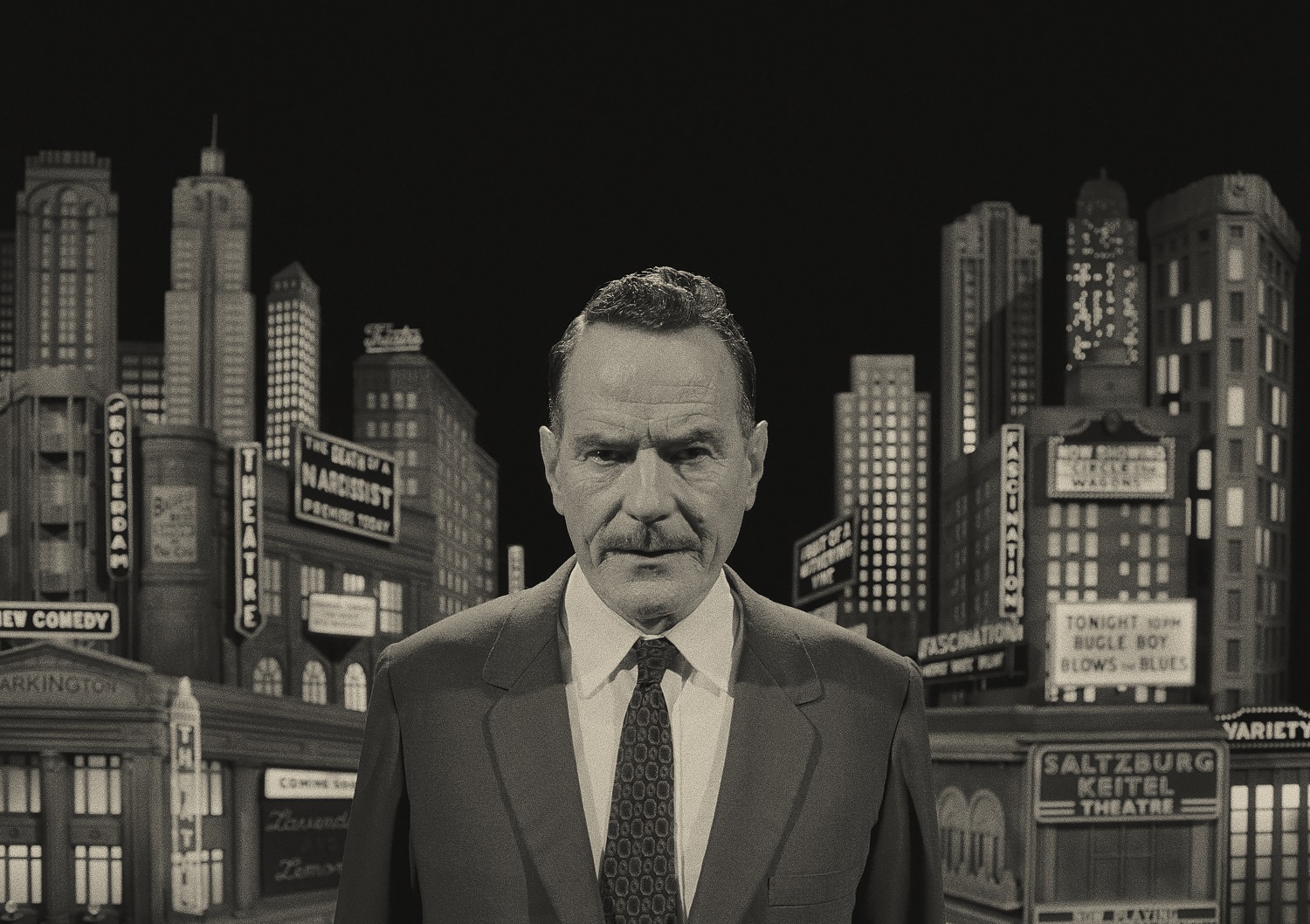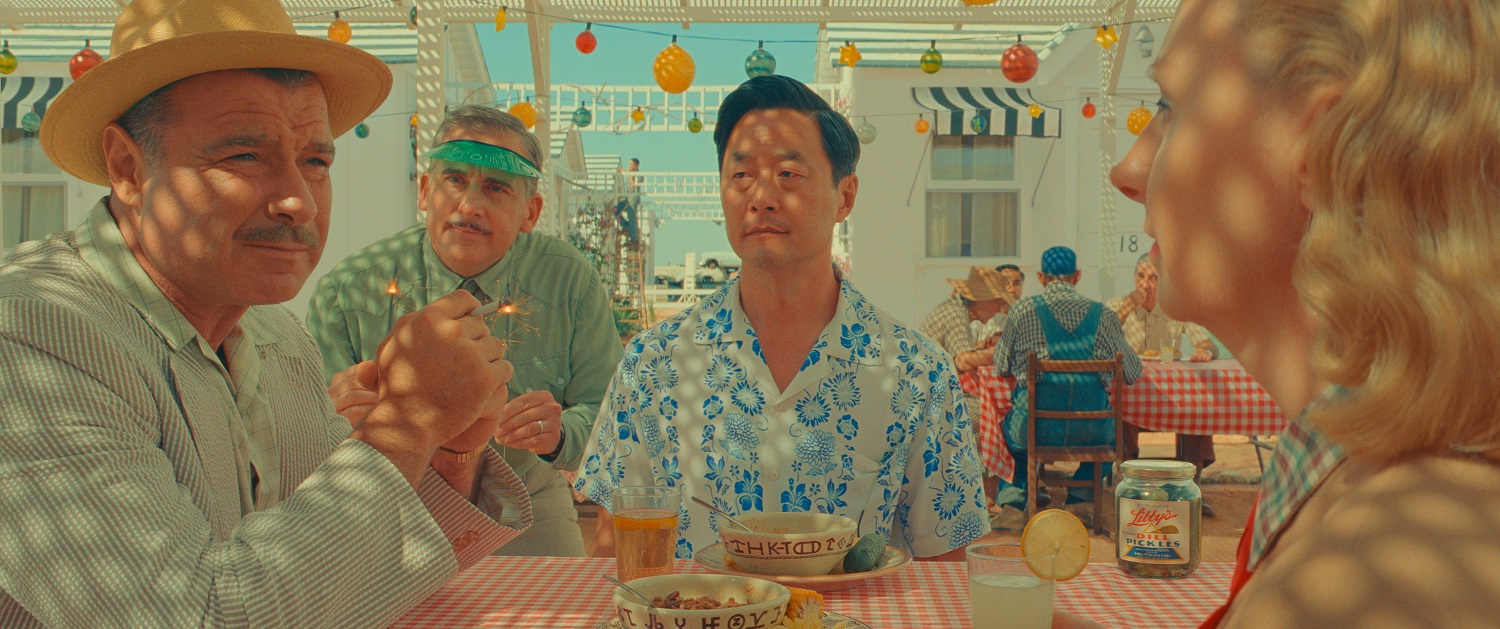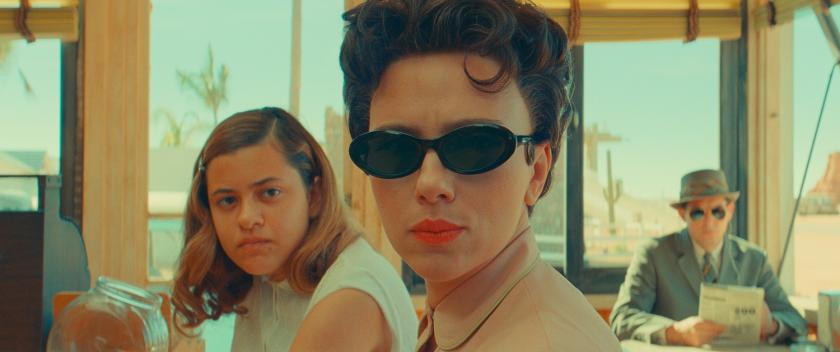Multi-media meta-layers land fast in Wes Anderson’s 11th film, overriding reality. Here’s Bryan Cranston’s portentous Fifties TV host (pictured below) in black-and-white, boxed Academy ratio, documenting rehearsals for a televised play, whose fictive reality then becomes a widescreen colour train hurtling through the desert. The latter scene's exhilarating cinema still sweeps you up.
We spend most of our time in that train’s desert stop, Asteroid City, where Steve Carell’s oily motel manager is on hand to greet the Junior Stargazers convention, including Woodrow Steenbeck (Jake Ryan), his war photographer dad Augie (Jason Schwartzman), incognito film star Midge Campbell (Scarlett Johansson), and an all-star cast of cowboys, scientists, soldiers, and other strays blowing through this dusty, provisional, Ike-era settlement.
Augie is hiding his wife’s death from their kids, to the split-screen phone fury of patriarch-in-law Stanley (Tom Hanks). Midge sports dark glasses to cover greasepaint bruises, and lets Augie’s camera catch her brooding stares and body. Meanwhile, Cranston’s TV documentary follows the play’s Tennessee Williams-like author, Conrad Earp (Edward Norton), and original director Schubert Green (Adrien Brody in Brando’s Kowalski vest). The regular reality punctures make plot summaries seem a mug’s game.
 Anderson’s sensibility has become a cult world with its own codes and border passports for knowing fans. The lattice of shadows across characters (as noir, Westerns and Nicholas Ray meet under the sun), the pastel hues, extreme distortions of scale, crafted sentences passing for speech, dryly antic, even slapstick absurdity and stellar rep company – all is present. Where the Coens’ build credible genre realities for their self-conscious concoctions, Anderson increasingly flaunts his unreality, though on his last film, The French Dispatch, only brittle fakery remained. As a viewer, you’re in or you’re out.
Anderson’s sensibility has become a cult world with its own codes and border passports for knowing fans. The lattice of shadows across characters (as noir, Westerns and Nicholas Ray meet under the sun), the pastel hues, extreme distortions of scale, crafted sentences passing for speech, dryly antic, even slapstick absurdity and stellar rep company – all is present. Where the Coens’ build credible genre realities for their self-conscious concoctions, Anderson increasingly flaunts his unreality, though on his last film, The French Dispatch, only brittle fakery remained. As a viewer, you’re in or you’re out.
Asteroid City relishes the high seriousness of post-war Broadway and TV drama, the declamatory grit of crusading, bedhopping writers and the Method’s now mannered new realism. “Keep telling the story,” someone meanwhile advises. And more: “You can’t wake up if you don’t fall asleep.” Foregrounding the reality that this is make-believe doesn’t mean we can’t lose ourselves on screen, or that even Anderson’s highly rendered works can’t be transformative dreams. Those lines are his statement of faith.
 Then there’s the cast, queuing to appear as they once did for Woody Allen. Johanssen again deploys her charismatic film star beauty with high intelligence, making Midge sultry and weary, framed in her motel window like Marilyn in a Hopper painting, now Arthur Miller’s equal with Stella Adler lessons learned, but still on the run. The sheer quantity of skilled stars has its own value (Liev Schreiber, Steve Carrell, Stephen Park and Hope Davis pictured above).
Then there’s the cast, queuing to appear as they once did for Woody Allen. Johanssen again deploys her charismatic film star beauty with high intelligence, making Midge sultry and weary, framed in her motel window like Marilyn in a Hopper painting, now Arthur Miller’s equal with Stella Adler lessons learned, but still on the run. The sheer quantity of skilled stars has its own value (Liev Schreiber, Steve Carrell, Stephen Park and Hope Davis pictured above).
Anderson’s idealism is expressed through his manically perfect constructs, fetishised and filtered through irony. But there is almost always an emotional core, its heartbeat defiantly pulsing inside the machine: Ralph Fiennes’ concierge’s fatal anti-fascist nobility in The Grand Budapest Hotel, The Darjeeling Limited’s fraternal bond and yearning Kinks soundtrack, or Moonrise Kingdom’s smitten 12-year-old outlaws. In Asteroid City, it’s the clever children again, as Woodrow and the rest resist US Army occupation. And it’s Margot Robbie as, in various forms, Augie’s dead wife, talking from beyond her role’s grave on a fire escape between Broadway acts, grief blurring with the magic of art.
Anderson’s balance between artifice and feeling isn’t at its most affectingly poised this time, but the rarefied invention is still worth visiting.















Add comment